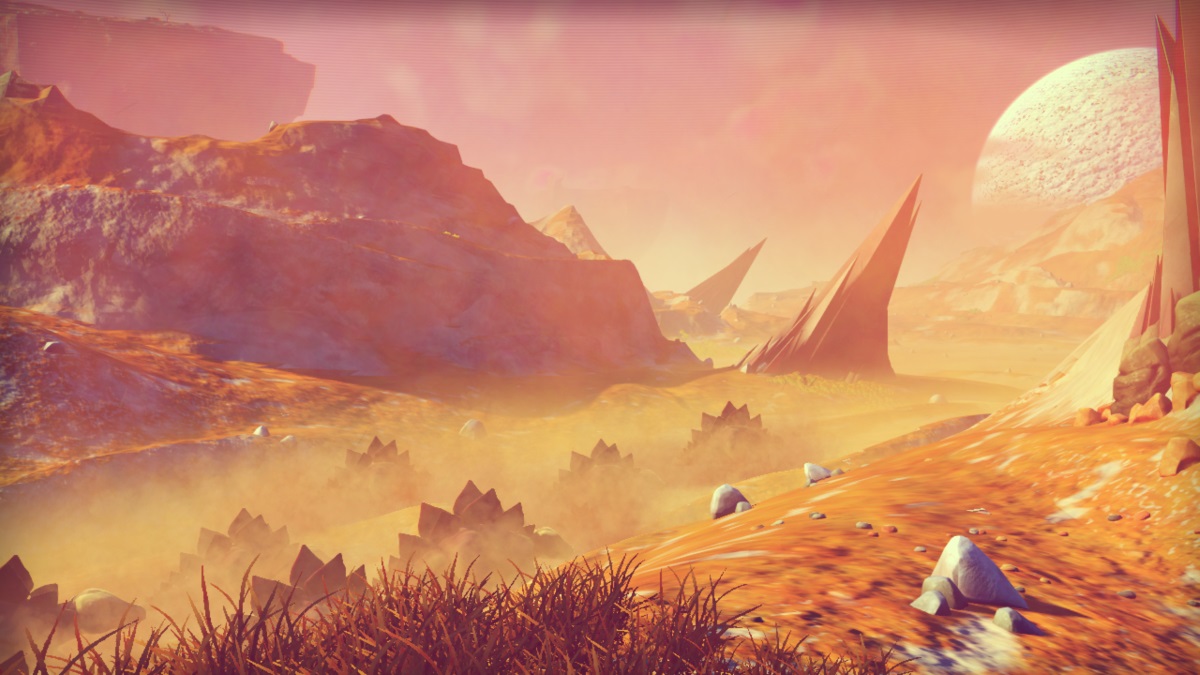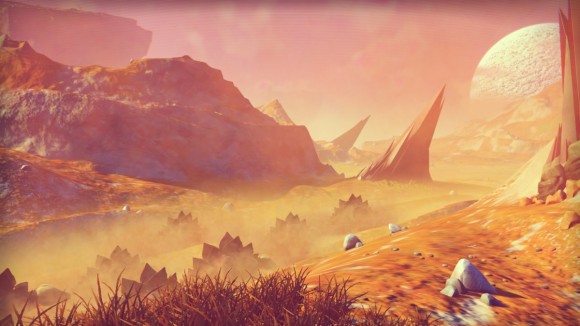Like much of the internet’s gaming population, the hype monkey has been tickling me with the teaser trailers released for Hello Games’ No Man’s Sky. It’s no secret that I’m rather a fan of space adventure or science fictional games of many stripes, and so this is to be expected.
And yet. And yet. I need to get this monkey off my back.
To do so let’s roll back to 2008 – no, in fact, let’s roll back to 2005, to the Game Developer’s Conference in San Francisco. Will Wright takes to the stage and for the next thirty-five minutes captivates his audience talking about the title he is currently working on: Spore. I wasn’t there, but I imagine the audience were on the edge of their seats. I was, thousands of miles away, sat in a friend’s bedroom and listening to Wright talk through the prototype via YouTube (which was new then – a fact I can barely believe today).
On release in 2008 Spore proved… divisive. If nothing else it suffered a degree of Molynitis, a condition that affects some high-profile game designers and producers. The promise of that talk and that prototype video was raw and untamed, and the process of converting something visionary into a product fit for mass market often involves a lot of compromise.
But I’m not here to talk about Spore as a whole. As one of many who’d keenly awaited the release of Wright’s brainchild since 2006 I’d spent a lot of time wondering about what the later stages of the game would be like. It was the Space stage that excited me most.
I knew very little about it, subsisting primarily on promise and projection. And it’s the latter that really did me in. From the tidbits available I anticipated a sprawling endgame of exploration and adventure, replete with unique experiences and moments of genuine wonder.
I projected onto Spore’s space stage what I wanted: something akin to Star Control 2, one of the most beloved games of my childhood and conceptually one of the poster-children for that unattainable desire, ‘my perfect game’. Pre-release, Spore was a vessel into which gaming desires were poured.
But this can only crack the vessel. Untrammelled desire creates unrealistic expectations, and failure to meet expectations produces disappointment. I’m sure I was not the only person disappointed to discover that Spore was not what I – we – had imagined it to be, had wanted it to be.
Replaying Spore in recent weeks I’ve actually found it a perfectly entertaining game on its own merits. The Creature stage is where it is at its finest, but the nature of its Watchmaker concept drives progression ever onwards, culminating in godhead and ultimate mastery over the very stars themselves. Well, you get to fly around a big, procedurally generated galaxy. It’s pretty cool, even if its MMO-inspired quantitative objectives seem to lack even more imagination today than they did in 2008.
It seems obvious, in retrospect, that Spore was unlikely to deliver on what I had imagined it to be. Its galaxy and near everything in it are a combination of procedural generation, crowdsourced asset design and generalised back story. It’s impossible to meet a truly interesting alien species because the game draws on a pool of simple backstories designed to mirror the potential routes that players can take through their ‘authored evolution’. There can be no compelling backstory akin to the Ur-Quan Path of Now and Forever. The alien species you meet may look cosmetically different, but ultimately they come in less than a dozen flavours.
So too the events in which you participate or the things you encounter. It’s all fundamentally generic – and I don’t mean as in science fiction, I mean of a type. Even the Grox, the game’s big bads, are just a virulent and unpleasant variant on what the game already includes. Finding Earth nets you a meaningless achievement. The wonderful secret at the centre of the galaxy is… well, it’s a gag and a mechanical shortcut. Cute, but not going to leave a lasting impression.
This is not the fault of Spore. It is what it is. But what might have been an enjoyable game suffered as a result of the hype that was encouraged around it, the unrealistic expectations I projected onto it based on vague promise and personal desire, and the fundamental limitations of core design choices.
I see similar risks in the excitement around No Man’s Sky. The second most common remark made about the game, right after something about how amazing it looks, is that no one knows what it’s really about. What are your objectives? What do you do? What makes it fun?
Thus far, there’s largely just the promise of exploration to go on. This worries me. No game universe can be like our own, composed of interlocking systems of dizzying complexity, and so most of the finest moments of videogame exploration are derived from experiences that are at least to some degree authored. By this I mean that conscious effort has been put into storytelling through whatever means, be that lore, implicit suggestion, art design, dialogue, or whopping great reams of clumsy exposition.
This isn’t something that one can procedurally generate or open up to crowdsourced design. The former cannot create compelling stories, and the latter cannot sufficiently integrate into a game that is out of the asset creator’s purview. You can add a little bit of text about how a space diplodocus was once an intelligent space-faring species that consciously decided to devolve and live in harmony with natural ecological systems, but it doesn’t mean shit if it has no further impact. Context, as I’m so fond of saying, is key.
What I’m getting at here is this: everything that has so far excited us about No Man’s Sky as a game rather than a piece of technology is cosmetic. As a game we know nothing about it, and I worry that exploring its universe may turn out to be little more than the Michelin I-Spy book of space fantasy.
Another game I like to think of when the subject of No Man’s Sky comes up is Outer Wilds. It too is still under development although playable versions have been available for some time. It’s a rather splendid little SF experience. The basic gist is that you’re a space pilot off to explore your solar system, but little do you know that something cataclysmic is going to occur twenty minutes into the game. Each time it does you find yourself set back those twenty minutes. You’re left to explore as you see fit, and perhaps understand what is happening.
Outer Wilds is a wholly authored game set in a solar system whose planetary bodies – plus the occasional other object – move consistently in various three-dimensional orbits. Matching velocity and direction is a fun challenge; a successful landing and getting out to explore the same. It sounds a bit familiar, doesn’t it? Yet I have a suspicion that Outer Wilds‘ ten or so planets may offer more unique experiences and mysteries than all the hundreds or thousands No Man’s Sky will, because authorship trumps the small variations that can be seen from the invisible work of a set of algorithms.
Perhaps I’m being over-cautious about No Man’s Sky: once burned, twice shy. For all my concern, it remains one of the few high-profile forthcoming releases I’m interested in.
All I can really suggest is that you do what I do: in the absence of actual information about No Man’s Sky, don’t begin projecting your hopes and dreams onto it. Get the hype monkey off your back. It would be a shame to see something potentially pleasant over-inflated by an excess of blind faith, only to burst under the strain.


Comments
7 responses to “Will No Man’s Sky offer more than facile tourism?”
Great article, unfortunately, I don't understand why you are not also excited about D4 – also known as the best sequel to the great and glorious game 'Deadly Premonition'.
Thanks man!
I actually haven't really looked at any of the stuff that has come out of E3, so if it wasn't talked about on Idle Thumbs or Midnight Resistance, or I didn't happen to see it mentioned on any of the sites I read, chances are I'm not really aware of it.
No Man's Sky is in my eyeline because I was excited about the first trailers they showed a while back…
Well, we need to rectify that.
Have you had the chance to check out Starbound? I get similar vibes from NMS. I'm not sure if it's because I played too much Terraria and was burnt out but I just couldn't get into the exploring of different planets. It's weird because even though there are an 'infinite' amount of worlds, there's not exactly much to do that's fun unless you enjoy building. I'd rather play something a little tighter because without a challenge or grind I tend to lose interest.
Not sure if analogy works but NMS reminds me of when I worked in a grocery store stacking shelves. One thing we had to do was called "facing" which entails bringing the stock to the front of the shelf blocking any empty space to give the illusion that the shelf was full. NMS has a great front but I'm not sure if there's any depth to it.
I've not played Starbound though I've seen a bunch of gameplay footage and played a little Terraria.
One thing that interested me about Terraria was all the bosses you could run into, or provoke through certain actions, which I felt promised a bit of spice and excitement that you didn't really get in Minecraft. However I never really got on with Terraria's fiddly UI (I know; crap excuse) so I never experienced any of that myself. Interesting what you say about Starbound here, though!
Ha, I really like the facing metaphor. I remember doing a lot of that too back in my time spent stacking shelves in Co-op stores. I think there's quite a lot of "facing" in AAA development in general, but it's particularly applicable with procedurally generated content (particularly given that you're facing up identical tins and packets all the time).
I was just thinking exactly the same thing about Starbound. The planets in that are procedurally-generated, too, but once you've seen one of each type of planet and completed the handful of quests available in the current early access build, it really does start wearing a little thin.
The more and more the NMS devs use the term 'exploration' to describe the style of gameplay, the more I suspect it's going to end up as a similar experience to what Starbound is now in its early access state. This article has hit the nail on the head.
[…] “Will No Man’s Sky offer more than facile tourism?†– Shaun Green […]